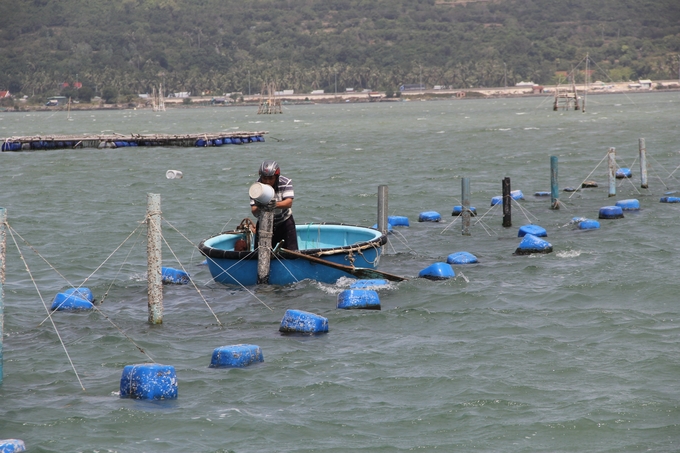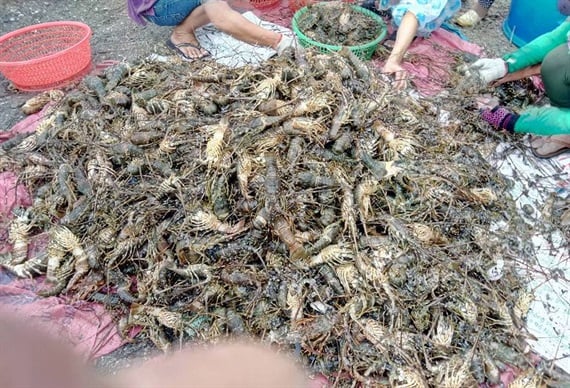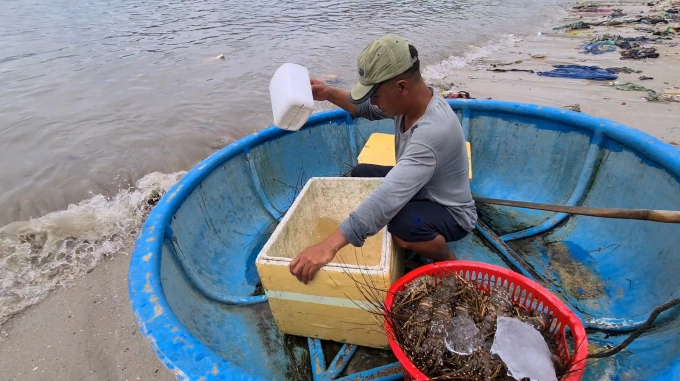May 30, 2025 | 11:47 GMT +7
May 30, 2025 | 11:47 GMT +7
Hotline: 0913.378.918
May 30, 2025 | 11:47 GMT +7
Hotline: 0913.378.918
Tran Van Tuan, a farmer raising lobster in in cages in Xuan Yen ward, Song Cau town (Phu Yen), said that in recent years, the water quality in the aquaculture area has not been guaranteed with environmental problems often occurring, causing heavy damage to fish and shrimp so farmers become exhausted.

In recent years, the lobster farming area in Song Cau town has often suffered from environmental incidents, causing damage to farmed shrimp. Photo: KS.
Authority practical inspection has showed that the situation of shrimp and fish deaths often occurred in a short and sudden time. Before it happened, the water environment in farming areas and the health status of farmed fish were not abnormal and without any signs of disease. An unforgettable environmental incident happened to lobster farmers in Song Cau town in 2017, killing millions of lobsters, causing heavy damage to farmers. Most recently, on August 10, at Dam Dan farming area in Phuoc Ly quarter, Xuan Yen ward, the sudden death also occurred to lobster and sea fish raised in cages. According to Phu Yen Department of Agriculture and Rural Development, it is estimated that 200 cages with 30,740 lobsters and 1,220 fish of all kinds, mainly grouper and cobia, were damaged. Dead lobster and fish were with different sizes, even reaching big sizes for sale. When shrimp and fish died, the water environment in the coastal area turned reddish brown.

In 2017, an environmental incident caused severe damage to lobster farmers in Song Cau town. Photo: KS.
Meanwhile, water emergency monitoring results from samples collected by the provincial Department of Aquatic Resources in the aquaculture farming area with sudden death of lobsters in Phuoc Ly neighborhood - Xuan Yen ward on August 11 showed that water quality was bad with a low dissolved oxygen index while the degree of N-NH4+, COD, P-PO43- are over the allowable limit.
Therefore, from the above data, the Department of Agriculture and Rural Development stated that shrimp and fish cultured in cages died due to environmental problems (lack of oxygen and asphyxiation) similar to that of cage-raised aquatic species dying due to environmental change happened in recent years in Song Cau town.
To limit risks and reduce damage caused by environmental incidents, epidemics and natural disasters such as heat, rain, storms, etc. for cage aquaculture farmers in the coming time, Mr. Nguyen Tri Phuong, Deputy Director of the Department Phu Yen Agriculture and Rural Development proposed the People's Committee of Song Cau town to direct the Economic Department, the People's Committees of communes and wards and relevant units to propagate and mobilize farmers to raise livestock following local plans, as well as regulations on prevention of diseases in aquaculture.

To limit environmental incidents and diseases, farmers need to comply with the planning, protect the environment and collect leftovers and domestic waste for treatment. Photo: TTh.
In addition, there should be measures to manage farming areas and prevent widespread aquaculture development which are not following a plan that causes loss of control, overloading the farming environment. The local authorities should also mobilize farmers to collect dead aquatic products, leftover food, and waste from aquaculture activities to bring them ashore for treatment so as to limit environmental pollution in the farming area. They should provide information about monitoring results in various forms and issue environmental warnings and epidemics via functional units so that farmers can timely undertake measures to proactively prevent and limit risks and inform the functional sector when there are problems about diseases and the environment in the farming area with the aim to prevent and reduce damage to farmers. Localities should recommend and propagate for farmers to sell shrimp and aquaculture products when they reach commercial size and do not hold up to waiting for increasing prices. The number of cages and shrimp farms should be reduced to the lowest when the weather changes and before storm season.
Development asked the Sub-Department of Fisheries to guide farmers to comply with the state's current regulations on aquaculture, apply technical measures in raising and respond to environmental changes in aquaculture. Samples for environmental monitoring and warning should be regularly collected and especially increased with the frequency of sampling at times of sudden weather change or prolonged heat in areas with high risk of environmental incidents. to promptly advise farmers to proactively apply effective preventive measures.
The Sub-Department of Livestock Production and Veterinary Health should actively capture information and inspect the situation of farmed aquatic production when death or disease occurs; update reports on epidemic in accordance with regulations, identify causes, analyze, evaluate and guide farmers to proactively apply solutions to prevent and reduce damage.
Translated by Linh Nguyen
/2025/05/25/4127-3-073637_820.jpg)
(VAN) Thanks to the promotion from an FAO-implemented project, vegetable production in greenhouses in Moc Chau has seen strong development, from 1.5 hectares in 2021 to nearly 50 hectares in 2024.

(VAN) FAO has recently supported USD 140,000 to implement the project 'Risk mitigation human-animal interface risks through disease control initiatives in pig farming.'

(VAN) The People's Committee of Tra Vinh province has approved an adjustment to the investment policy for the Green Hydrogen Plant project, increasing its area to approximately 52.76 hectares.
![Reducing emissions from rice fields: [2] Farmers’ commitment to the soil](https://t.ex-cdn.com/nongnghiepmoitruong.vn/608w/files/news/2025/05/05/dsc08881jpg-nongnghiep-140632.jpg)
(VAN) Clean rice cultivation model in Thuong Tan commune, Bac Tan Uyen district, is assisting local residents in achieving sustainable agriculture by substantially reducing costs, increasing productivity, and protecting the environment.

(VAN) At the conference to disseminate Resolution No. 68, AgriS introduced its digital agricultural ecosystem and reaffirmed its commitment to accompanying the Government in promoting private sector development and sustainable agriculture.

(VAN) 'Blue Ocean - Blue Foods' initiative is designed to restore marine ecosystems and establish sustainable livelihoods for local communities by cultivating a minimum of 1,000 hectares of cottonii seaweed in the first three years.
/2025/05/21/4642-3-112707_603.jpg)
(VAN) The V-SCOPE project has made direct contributions to three out of six pillars of the Comprehensive Strategic Partnership between Vietnam and Australia.